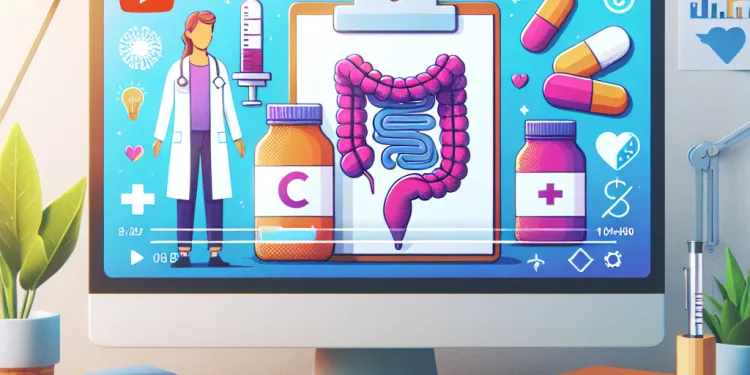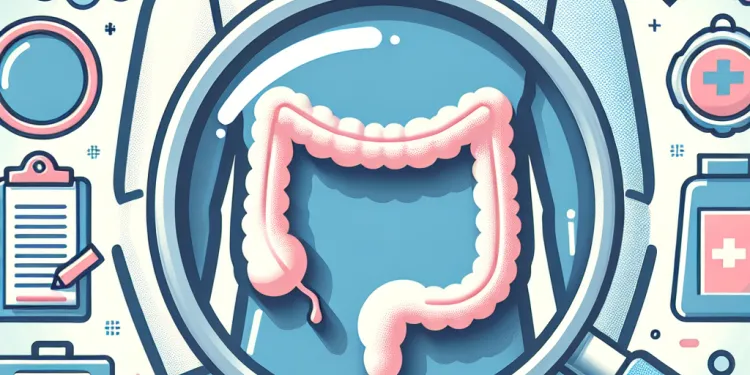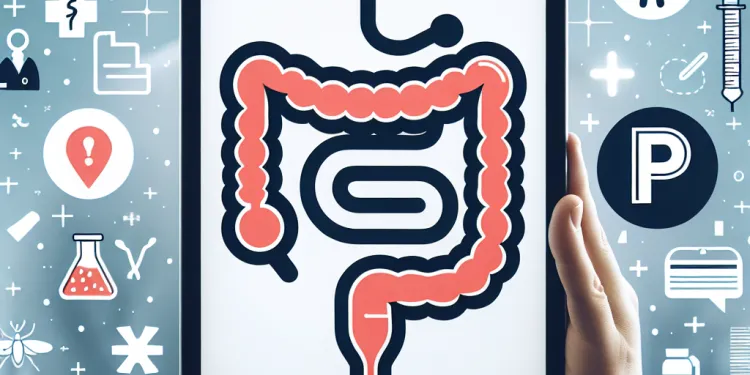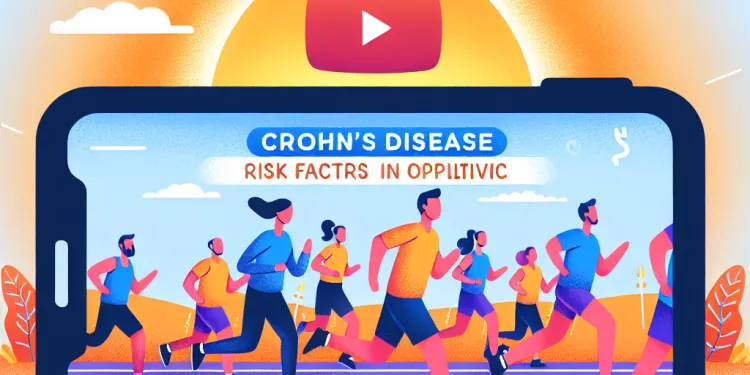Find Help
More Items From Ergsy search
-

Infliximab infusion (Remicade) for Crohns Disease at Addenbrookes NHS hospital
Relevance: 100%
-

What treatments are available for Crohn's disease?
Relevance: 51%
-

Is Crohn's disease contagious?
Relevance: 46%
-

Is there a cure for Crohn's disease?
Relevance: 46%
-

What causes Crohn's disease?
Relevance: 44%
-

How is Crohn's disease diagnosed?
Relevance: 44%
-

Is surgery necessary for Crohn's disease?
Relevance: 43%
-

What is Crohn’s disease and how is it treated?
Relevance: 42%
-

Are there any complications associated with Crohn's disease?
Relevance: 42%
-

Who is at risk of developing Crohn's disease?
Relevance: 42%
-

Can children develop Crohn's disease?
Relevance: 42%
-

What is the best diet for Crohn’s disease?
Relevance: 42%
-

What are the common symptoms of Crohn's disease?
Relevance: 42%
-

Can stress make Crohn's disease worse?
Relevance: 41%
-

How does smoking affect Crohn's disease?
Relevance: 41%
-

What support is available for people with Crohn's disease in the UK?
Relevance: 41%
-

What dietary changes can help manage Crohn's disease?
Relevance: 38%
-

What is ketamine infusion therapy?
Relevance: 34%
-

What should I expect during a ketamine infusion?
Relevance: 23%
-

Coeliac disease
Relevance: 16%
-

Coeliac Disease: Session 1: What is Coeliac Disease?
Relevance: 16%
-

Are there specific gut-related diseases that become more common with age?
Relevance: 15%
-

What is Lyme Disease?
Relevance: 15%
-

Is Huntington's disease fatal?
Relevance: 15%
-

Liver disease | NHS
Relevance: 15%
-

Causes of coeliac disease
Relevance: 15%
-

What is Huntington's disease?
Relevance: 15%
-

Lyme disease: What is it?
Relevance: 15%
-

What is Mitochondrial disease?
Relevance: 15%
-

What is Parkinson's disease?
Relevance: 15%
-

Is there a vaccine for Lyme disease?
Relevance: 15%
-

Is flesh-eating disease contagious?
Relevance: 15%
-

Symptoms of coeliac disease
Relevance: 15%
-

Do UK mosquitoes carry diseases?
Relevance: 15%
-

What is Alzheimer's disease?
Relevance: 14%
-

Do spiders in the UK carry diseases?
Relevance: 14%
-

What causes Huntington's disease?
Relevance: 14%
-

Can Lyme disease be treated?
Relevance: 14%
-

How is Lyme disease transmitted?
Relevance: 14%
-

Can Huntington's disease be prevented?
Relevance: 14%
Infliximab Infusion for Crohn's Disease at Addenbrooke's NHS Hospital
Introduction to Infliximab (Remicade)
Infliximab, marketed under the brand name Remicade, is a biologic therapy used to treat autoimmune diseases like Crohn's Disease. It is administered through an intravenous infusion and works by targeting and inhibiting a substance in the body called tumor necrosis factor-alpha (TNFα), which plays a crucial role in inflammatory processes. At Addenbrooke's NHS Hospital, patients with Crohn's Disease can receive this treatment to help manage their symptoms and improve their quality of life.
Treatment Process at Addenbrooke's NHS Hospital
At Addenbrooke's NHS Hospital, the administration of infliximab is conducted under the supervision of experienced healthcare professionals. The infusion typically takes about 2-3 hours, during which patients are monitored for any adverse reactions. The hospital's Infusion Suite is equipped with comfortable settings to ensure a stress-free experience for patients. Most patients begin with an induction phase, receiving infusions at week 0, 2, and 6, followed by maintenance doses every 8 weeks thereafter.
Benefits of Infliximab for Crohn's Disease
Infliximab has been shown to be particularly effective in reducing symptoms of Crohn's Disease such as abdominal pain, diarrhea, and weight loss. It can also help achieve and maintain remission, potentially reducing the need for surgical interventions. Patients often experience improvement in their overall well-being and daily functioning. The ability to receive treatment locally at Addenbrooke's NHS Hospital means patients have access to leading care without the need to travel long distances.
Considerations and Side Effects
While infliximab is effective, it is important to consider potential side effects. These can include infusion reactions, increased risk of infections, and allergic responses. Prior to beginning treatment, patients will have a thorough evaluation at Addenbrooke's NHS Hospital to ensure its suitability. Continuous monitoring and regular follow-up appointments help manage any risks and ensure that patients receive the best possible care.
Infliximab Infusion for Crohn's Disease at Addenbrooke's NHS Hospital
What is Infliximab (also known as Remicade)?
Infliximab, or Remicade, is a special medicine used to help people who have Crohn's Disease. It is a treatment that helps calm down the body's immune system. This is done through a drip (IV) in the hospital. At Addenbrooke's NHS Hospital, people with Crohn's Disease can have this treatment to help them feel better and enjoy life more.
How is the Treatment Given at Addenbrooke's NHS Hospital?
At Addenbrooke's Hospital, infliximab is given by doctors and nurses who know a lot about taking care of people. The drip takes about 2 to 3 hours. The nurses check on patients to make sure everything is okay. The Infusion Suite in the hospital is a comfy place, so people can relax during their treatment. At first, patients get the treatment three times: at the start, after 2 weeks, and then after 6 weeks. After this, they get it every 8 weeks.
How Does Infliximab Help with Crohn's Disease?
Infliximab is very good at helping with Crohn's Disease symptoms like tummy aches, diarrhea, and losing weight. It can help people feel better for a long time and might mean they do not need surgery. Many people feel happier and can do more things after getting this treatment. Getting the treatment at Addenbrooke's Hospital means people do not have to travel far to get great care.
Things to Know: Side Effects
Infliximab is helpful, but it might cause some side effects. These might include reactions to the drip, getting more infections, or allergies. Before starting the treatment, doctors at Addenbrooke's Hospital will check if it is right for each person. They will keep checking on patients regularly to make sure they stay safe and healthy. Regular check-ups at the hospital help manage any problems and make sure everyone feels their best.
Frequently Asked Questions
What is Infliximab (Remicade) and how does it work for Crohn's Disease?
Infliximab, marketed as Remicade, is a biologic therapy that works by blocking a protein called tumor necrosis factor-alpha (TNF-alpha), reducing inflammation and suppressing the overactive immune response associated with Crohn's Disease.
How is Infliximab administered at Addenbrookes Hospital?
Infliximab is given as an intravenous infusion, meaning it is delivered directly into the bloodstream through a vein at Addenbrookes NHS Hospital under supervised medical conditions.
How long does an Infliximab infusion take?
An Infliximab infusion typically takes between 2 to 3 hours. Patients will be monitored during the infusion for any adverse reactions.
How often do I need to receive Infliximab infusions?
The initial treatment usually involves infusions at weeks 0, 2, and 6, followed by maintenance infusions every 8 weeks, although the schedule may vary based on individual patient needs.
What should I expect during my first Infliximab infusion?
During your first infusion, medical staff will check your vital signs and begin the intravenous administration of Infliximab. You'll be observed throughout to ensure you don't experience any adverse reactions.
What are the potential side effects of Infliximab?
Common side effects include infusion-related reactions such as headache, dizziness, rash, and fever. Serious side effects can occur as well, so it's important to report any unusual symptoms to your healthcare team.
Can I receive Infliximab if I have other medical conditions?
It's important to discuss your complete medical history with your doctor at Addenbrookes, as some conditions may affect the suitability of Infliximab or require additional precautions.
Will Infliximab interact with my other medications?
Tell your healthcare provider about all medications you are taking, as Infliximab may interact with other drugs. This includes over-the-counter drugs and supplements.
How should I prepare for my Infliximab infusion at Addenbrookes?
There are no special preparations needed, but it is advised to eat a light meal beforehand and wear comfortable clothing. Bring any medications you may need and plan for a way to get home safely.
Is Infliximab treatment covered by the NHS?
Yes, Infliximab is covered by the NHS for the treatment of Crohn's Disease when prescribed by a specialist at a hospital like Addenbrookes.
Can I continue working and doing daily activities while receiving Infliximab?
Many patients continue their normal activities while on Infliximab, although you should avoid heavy lifting or stressful activities on the day of the infusion. Discuss your specific circumstances with your healthcare provider.
What should I do if I experience side effects after the infusion?
Contact your healthcare provider immediately if you experience any adverse effects or symptoms after receiving an Infliximab infusion, especially if they are severe or persistent.
How will I know if Infliximab is working for my Crohn's Disease?
Improvement in symptoms can be seen as early as a few weeks after starting treatment. Regular follow-ups and assessments will help determine the effectiveness of the therapy for your condition.
Can I receive Infliximab infusions if I'm pregnant or planning to become pregnant?
Discuss your plans and any concerns about pregnancy with your healthcare provider, as they will provide guidance based on your specific situation and latest clinical guidelines.
Who can I contact for more information about my Infliximab treatment at Addenbrookes?
For more information, you can contact your specialist team at Addenbrookes Hospital or the patient support services available through the NHS.
What is Infliximab (Remicade) and how does it help with Crohn's Disease?
Infliximab, also called Remicade, is a medicine. It helps people with Crohn's Disease feel better.
This medicine works by calming parts of the immune system. The immune system is like a bodyguard that fights germs. Sometimes, it can become too active and hurt the body instead. Infliximab helps to calm it down.
Crohn's Disease can cause tummy pain, diarrhea, and tiredness. Using Infliximab can help with these problems.
Some people also use special tools to understand better, like:
- Pictures or videos that show how the medicine works.
- Talking with a doctor or nurse who explains things simply.
Infliximab is a medicine. It is also called Remicade. This medicine helps by blocking a protein in the body. The protein is called TNF-alpha. Blocking this protein helps to reduce swelling and calm down the immune system. This is important for people with Crohn's Disease.
How do you get Infliximab at Addenbrookes Hospital?
1. You get Infliximab through a drip. This means it goes into your blood through a small tube in your arm.
2. Nurses at the hospital give you the medicine. They will be with you to help.
3. You need to stay at the hospital for a few hours. Bring a book, game, or something fun to do.
4. You might feel tired or unwell after. Tell a nurse if you do.
5. Ask questions if you need help. Nurses and doctors are there to make you feel better.
Infliximab is a medicine. It is given through a needle into a vein. This happens at Addenbrookes NHS Hospital. Doctors and nurses watch to make sure everything is safe.
How long does an Infliximab infusion take?
It takes about 2 hours to get the medicine called Infliximab. This is done through a drip in your arm. You can bring a book to read or listen to music while you wait.
Tip: You can use a timer or a clock to know when the 2 hours will be done. Bringing headphones to listen to music can help you feel relaxed.
Getting an Infliximab treatment takes 2 to 3 hours. While you get the treatment, nurses will watch you to make sure everything is okay.
How often do I need to get Infliximab medicine?
You might need to get your Infliximab medicine every few weeks. Your doctor will tell you how often you need it.
Here are some tips to help you:
- Use a calendar to mark the days you get your medicine.
- Ask someone you trust to remind you about your appointments.
- Use alarms on your phone as reminders.
At first, you will get medicine through a drip at weeks 0, 2, and 6. After that, you will get the medicine every 8 weeks. Sometimes, this might change if you need something different.
What will happen during my first Infliximab drip?
When you go for your first Infliximab medicine drip, here’s what will happen:
- Getting ready: A nurse will help you. They will check your weight and your blood pressure.
- Starting the drip: The nurse will put a small tube in your arm. The medicine will go through this tube.
- During the drip: You will sit in a comfy chair. You can read a book, listen to music, or watch a video. This will take a few hours.
- Checking on you: Nurses will watch you the whole time to make sure you are okay.
- Finishing up: When the drip is done, the nurse will take out the tube. You can go home after they check you are feeling well.
You can bring a friend or family member to keep you company. It’s a good idea to bring headphones, books, or games so you are not bored. Taking deep breaths can also help you relax.
When you get your first medicine drip, nurses will check your important health signs. They will start giving you the medicine called Infliximab through a drip. They will watch you the whole time to make sure you feel okay and don't have any bad reactions.
Support tips: If you feel scared or nervous, try taking slow, deep breaths. You can also bring a comforting item, like a favorite toy or blanket, to help you feel better.
What might happen if you take Infliximab?
Infliximab is a medicine. It helps people, but sometimes it can make you feel unwell. These are some things that might happen:
- You might get a headache.
- Your tummy could feel upset.
- You could start to feel very tired.
- Your skin might get itchy or have a rash.
- You could feel sick or vomit.
If you feel any of these things, tell a grown-up or your doctor. They can help you feel better.
You can use a tool like a picture chart to remember. Ask someone to help you learn about these things using pictures.
Sometimes, after a treatment, people may have some common side effects. These can be a headache, feeling dizzy, getting a rash, or having a fever. If you have any of these or if you feel something is not right, tell your doctor or nurse. They can help you.
Can I take Infliximab if I am sick with something else?
Talk to your doctor at Addenbrookes about all your past and present health problems. Some health problems can change how safe Infliximab is for you. You might need extra care.
Will Infliximab work with my other medicines?
If you take Infliximab, it is important to tell your doctor about all the other medicines you use. This includes pills, creams, or anything else you take for your health.
Some medicines might not mix well with Infliximab. Your doctor can check if your medicines are safe to use together.
Keep a list of all your medicines. Show this list to your doctor or nurse. It can help them make sure everything is okay.
If you use a phone or tablet, you can try apps that help you track your medicines. These can remind you what to take and when.
Tell your doctor about all the medicines you take. Infliximab can mix badly with other drugs. This means you should tell your doctor about any pills you buy yourself and any vitamins or supplements you use.
Getting Ready for Your Infliximab Treatment at Addenbrookes
Here is how you can get ready for your Infliximab treatment at the hospital:
- Ask for Help: If you have questions, ask a nurse or doctor. They can help.
- Bring a Friend: Take someone with you for support.
- Comfort Items: Bring a book, game, or music to keep you busy.
- Wear Comfy Clothes: Wear loose and comfy clothes.
- Snacks and Water: Pack a snack and a drink.
Remember, it’s okay to feel nervous. Talking about your feelings can help. You are doing great!
You don't need to do anything special to get ready. It's a good idea to eat something small first and wear clothes that are easy to move in. Bring any medicine you need with you. Make sure you have a safe way to get back home afterwards.
Does the NHS pay for Infliximab medicine?
Yes, the NHS pays for a medicine called Infliximab. Doctors at hospitals, like Addenbrookes, can give it to help people with Crohn's Disease.
Can I keep working and doing everyday things while taking Infliximab?
Yes, most people can still do their usual activities and work while taking Infliximab. But everyone is different. Here are some things to help:
- Listen to your body. Rest when you feel tired.
- Ask your doctor if it's okay for you to work or do certain activities.
- Keep a diary of how you feel during treatment.
- Tell your doctor if you feel unwell.
Ask friends or family for help if you need it.
Lots of people keep doing their usual things when they take Infliximab. But, on the day you get it, do not lift heavy things or do anything stressful. Talk to your doctor about what is best for you.
What can I do if I feel unwell after the treatment?
If you feel sick after the treatment, you can:
- Tell a doctor or nurse right away.
- Write down what you feel to tell the doctor.
- Ask a friend or family member to stay with you.
Using these tools can help:
- Keep a simple diary of your symptoms.
- Use pictures to show how you feel.
- Ask for someone to explain things in a way you understand.
Call your doctor right away if you feel bad or notice anything wrong after your Infliximab medicine. Do this if it feels really bad or does not go away.
How can I tell if Infliximab is helping my Crohn's Disease?
Feel Better: You might have less tummy pain and be able to eat more foods without feeling sick.
More Energy: You might have more energy and feel less tired.
Fewer Toilet Trips: You might not need to go to the toilet as much.
Talk to Your Doctor: Your doctor can check if the medicine is working. They might do some tests.
Tools to Help You: Keep a diary of how you feel each day. Use happy or sad faces to show if you feel good or bad.
You can also ask a grown-up to help you write down changes you notice.
You may start to feel better a few weeks after starting your treatment. It's important to have regular check-ups to see if the treatment is working well for you.
Can I have Infliximab if I'm pregnant or want to have a baby?
Talk to your doctor or nurse about your plans and any worries you have about having a baby. They can give you advice that is just right for you.
Who can I talk to if I need to know more about my Infliximab medicine at Addenbrookes?
If you want to know more, you can talk to your team at Addenbrookes Hospital. You can also get help from NHS support services.
Useful Links
This website offers general information and is not a substitute for professional advice.
Always seek guidance from qualified professionals.
If you have any medical concerns or need urgent help, contact a healthcare professional or emergency services immediately.
Some of this content was generated with AI assistance. We’ve done our best to keep it accurate, helpful, and human-friendly.
- Ergsy carfully checks the information in the videos we provide here.
- Videos shown by Youtube after a video has completed, have NOT been reviewed by ERGSY.
- To view, click the arrow in centre of video.
- Most of the videos you find here will have subtitles and/or closed captions available.
- You may need to turn these on, and choose your preferred language.
- Go to the video you'd like to watch.
- If closed captions (CC) are available, settings will be visible on the bottom right of the video player.
- To turn on Captions, click settings .
- To turn off Captions, click settings again.
More Items From Ergsy search
-

Infliximab infusion (Remicade) for Crohns Disease at Addenbrookes NHS hospital
Relevance: 100%
-

What treatments are available for Crohn's disease?
Relevance: 51%
-

Is Crohn's disease contagious?
Relevance: 46%
-

Is there a cure for Crohn's disease?
Relevance: 46%
-

What causes Crohn's disease?
Relevance: 44%
-

How is Crohn's disease diagnosed?
Relevance: 44%
-

Is surgery necessary for Crohn's disease?
Relevance: 43%
-

What is Crohn’s disease and how is it treated?
Relevance: 42%
-

Are there any complications associated with Crohn's disease?
Relevance: 42%
-

Who is at risk of developing Crohn's disease?
Relevance: 42%
-

Can children develop Crohn's disease?
Relevance: 42%
-

What is the best diet for Crohn’s disease?
Relevance: 42%
-

What are the common symptoms of Crohn's disease?
Relevance: 42%
-

Can stress make Crohn's disease worse?
Relevance: 41%
-

How does smoking affect Crohn's disease?
Relevance: 41%
-

What support is available for people with Crohn's disease in the UK?
Relevance: 41%
-

What dietary changes can help manage Crohn's disease?
Relevance: 38%
-

What is ketamine infusion therapy?
Relevance: 34%
-

What should I expect during a ketamine infusion?
Relevance: 23%
-

Coeliac disease
Relevance: 16%
-

Coeliac Disease: Session 1: What is Coeliac Disease?
Relevance: 16%
-

Are there specific gut-related diseases that become more common with age?
Relevance: 15%
-

What is Lyme Disease?
Relevance: 15%
-

Is Huntington's disease fatal?
Relevance: 15%
-

Liver disease | NHS
Relevance: 15%
-

Causes of coeliac disease
Relevance: 15%
-

What is Huntington's disease?
Relevance: 15%
-

Lyme disease: What is it?
Relevance: 15%
-

What is Mitochondrial disease?
Relevance: 15%
-

What is Parkinson's disease?
Relevance: 15%
-

Is there a vaccine for Lyme disease?
Relevance: 15%
-

Is flesh-eating disease contagious?
Relevance: 15%
-

Symptoms of coeliac disease
Relevance: 15%
-

Do UK mosquitoes carry diseases?
Relevance: 15%
-

What is Alzheimer's disease?
Relevance: 14%
-

Do spiders in the UK carry diseases?
Relevance: 14%
-

What causes Huntington's disease?
Relevance: 14%
-

Can Lyme disease be treated?
Relevance: 14%
-

How is Lyme disease transmitted?
Relevance: 14%
-

Can Huntington's disease be prevented?
Relevance: 14%


